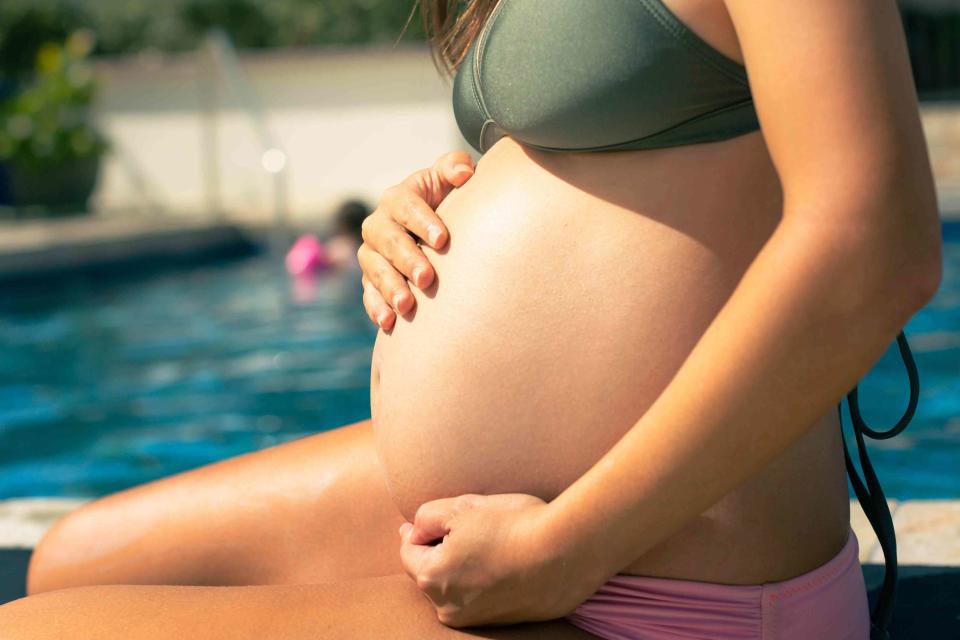Your Cheat Sheet to Pregnancy-Safe Skin Care
Here's what you can slather on — and what to avoid.

Getty Images
There are a lot of major changes when you’re navigating the wild journey of pregnancy. It can be a joyous time, but it also can be extremely confusing — especially when it comes to the right skincare routine. Not only does it seemingly feel like a new pregnancy-related beauty issue pops up every week, but there’s also the matter of what’s safe to use to treat them.
Read on for our dermatologist-approved guide to better understand what’s going on with your skin while you’re pregnant — and how to treat your concerns.
Related: Pregnancy Threw My Skin For a Loop — These Three Products Were My Saving Grace
How Skin Changes During Pregnancy
News flash: The famous pregnancy “glow” (the flush you experience from increased blood flow) doesn’t last forever. But it turns out that things like stretch marks and melasma are happy to stick around for a while. “We can attribute most skincare changes during pregnancy to shifting hormones,” says Hayley Goldbach, MD, a double board-certified dermatologist and professor of dermatology at Brown University. These changes include:
Stretch Marks
As your body juggles weight changes, fluid retention, and your skin stretching to accommodate your growing baby, these tiny tears in your skin are super common. “We don't know why certain people are more prone to these stretch marks, but there may be a genetic component,” says Dr. Goldbach.
Melasma
Also known as “the mask of pregnancy,” melasma is “a darkening of the skin — typically on your cheeks and forehead — caused by increased activation of melanocytes which are the cells that give your skin color,” says Dr. Goldbach.
Linea Negra
“This is a dark line seen down the center of your belly," Dr. Goldbach says. "It may be due to increased levels of a sex hormone called progesterone — and possibly other hormones secreted by the placenta."
Acne
“Some people experience an increase in oil production that can contribute to worsening acne,” says Martha H. Viera, MD, a board-certified dermatologist in Coral Gables, FL. Plus, your body’s estrogen surge can cause an overproduction of skin pigment — meaning dark spots post-breakout may be darker.
How to Adjust Your Skincare Routine for Pregnancy
It’s more important than ever to keep your dermatologist updated with any skin issues or concerns while pregnant. Even if you’re not a first-time mom, every pregnancy is unique, and your skin can react differently to the same products you’ve used before. “I typically recommend a less-is-more approach to skincare during pregnancy,” says Dr. Goldbach.
You don’t necessarily have to eliminate all your products, but pregnancy is a great reason why many people start thinking about clean skincare products, since there’s so much uncertainty when it comes to ingredient safety for your developing babe.
Related: This Body Oil Gets Rid of Fine Lines and Crepiness So Well, Supermodels Use It While Pregnant
For starters, “a good sunscreen is critical for preventing melasma and hyperpigmentation. As a pregnant dermatologist, I typically opt for mineral-based sunscreen,” says Dr. Goldbach. :I use Pipette Mineral Sunscreen SPF 50 and Ilia Super Serum Skin Tint with SPF 40 for light coverage with SPF benefits. Both of these products have clean ingredients." If you’re chasing that coveted glow during your pregnancy, use a super-gentle exfoliator like glycolic or lactic acid in low concentrations and follow up with a product featuring “vitamin C, which is a glowy skin powerhouse and safe to use,” she says.
Hydration is key when you’re experiencing stretch marks. “Focus on moisturizing ingredients like hyaluronic acid that provide a cushion for your skin,” says Dr. Viera. “Unfortunately, there is not strong evidence for creams to prevent these marks, but some procedures performed postpartum by board-certified dermatologists can help minimize the appearance,” adds Dr. Goldbach. If you’re missing the anti-aging and acne-clearing benefits of your retinoid products, “consider switching to bakuchiol, which is safer to use when you’re expecting,” she says.
Skincare Ingredients to Avoid During Pregnancy
Speaking of retinoids, they’re one of the top ingredients on your pregnancy no-no list. “Stay clear of all topical and oral retinoids, benzoyl peroxide, salicylic acid, hydroquinone, and artificial fragrances in your products. These are often marked on your ingredient labels as ‘parfum’ or ‘fragrance,’ which can contain endocrine-disrupting phthalates,” says Dr. Goldbach.
While the FDA conveniently breaks down the safety of ingredients during pregnancy into different categories (A, B, C, D, or X — where ingredients that are labeled under categories A and B are considered safe to use and category X is prohibited), it’s best to vet your routine by an expert.
We can’t reiterate enough to keep your dermatologist on speed dial regarding pregnancy-related skin concerns — and kudos to you for being diligent about your research. Your skin (and baby) will thank you.
Related: 4 Black Moms on Their Personal Style Evolution While Pregnant
For more InStyle news, make sure to sign up for our newsletter!
Read the original article on InStyle.

